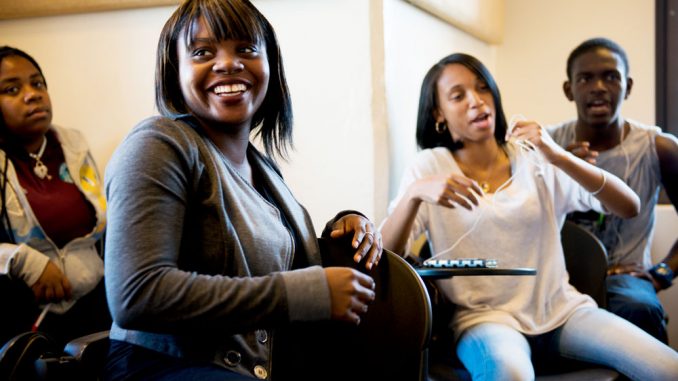
Recent education budget cuts in the Philadelphia School District left many high schools without counselors, administrators and civics courses. Despite this challenge, and numerous challenges that today’s youth faces within the local Philadelphia area, Temple Voices provides a supplemental learning environment that youth wouldn’t normally receive given those circumstances.
Temple Voices was created in 2001 by the University Community Collaborative. It sought to build the individual and power of youth through collaborative research, education and relationship building with community partners, nonprofit organizations and government agencies.
The UCC allocates nearly 90 percent of its funding and efforts to supporting programs to encourage the disengaged youth to remain active within the community. Temple Voices has become the centerpiece of UCC’s efforts in this goal.
Today, Temple Voices utilizes social media and technology to send its messages to communities in the hopes of implementing positive social change.
“When I first came here, I was really amazed by the intelligence and the genuineness of their [Temple Voices students’] conversations about what was going on around them,” Temple Voices Program Coordinator Johannah Bennett said. “With all of the skyscrapers that Temple is building, they almost shadow the community. I feel that programs like ours are really what’s connecting the community and making people feel like they’re a part of the community. We aren’t a separate entity.”
Students of Temple Voices script, write, perform, produce and edit their own content based on any subject they choose. In past years, students have conducted social experiments and interviews regarding issues facing their communities.
In 2009, members presented their findings after researching how drugs impacted their communities in a short documentary. The group also created a website that includes all of the information they discovered.
This documentary is one of the 30 or more videos that Voices has produced, each dealing with an issue concerning the surrounding area.
“When they’re here, I try to make it an enjoyable space so they can get away from everything else that might be going on,” Bennett said. “Philly is really segregated, not only by race, but by communities, too. People will stay in North or South Philly and it’s even worse by neighborhoods and schools. So having all these kids from different schools, grades, different backgrounds and financial situations is hard to do.”
“At first, I only came for the community service,” Parkway Northwest 12th grader Jenza Evans said. “Then, as the year progressed, I was actually excited to come to Voices when I realized that we were actually making positive changes. At first I came for the hours, but I stayed for the experience.”

Evans became thoroughly involved in the program, especially in last year’s project when she and her partners discussed how the media portrays individuals and defines society. As a student, Evans said feels she has a voice when she works with the group.
“I feel like when kids try to say something, they aren’t listened to,” Evans said. “They aren’t heard. But if we get together in a big group, we can show people that some kids understand what’s going on in the community, even though people or the government don’t care, just because we are kids. In a group like this, they might take us into consideration.”
Being a part of Temple Voices provides Evans with a sense of accomplishment and confidence, she said.
“I really love it, seeing how I change the community, because people say that I’m handling myself well and I’m not like the other kids,” Evans said. “It makes me feel like I’m a good person and that I’m doing something right.”
The success that Temple Voices is known for has not gone unnoticed. Psychology professor from the College of New Jersey He Len Chung has been attending Temple Voices meetings and sessions for the past few months in hopes of gaining insight into implementing Voices in her own school.
“I am really interested in working with kids who are on the verge of dropping out of school or are on probation,” Chung said. “So, Voices was kind enough to let me come for the past few months so I can find out what works and what doesn’t work, so we can have something like this at my school. I think [Voices] is really great for these kids who don’t have the same resources as others.”
At the end of the meeting, students expanded a group activity into a discussion of racism, segregation and socioeconomic inequality. Before they left, Bennett exchanged the students’ signatures on a sheet of paper for a subway token to get home.
Philadelphia High School for Girls 10th grader Hakieya Burrell-Sims said she sees tremendous value in Temple Voices as a program that promotes youth leadership and responsibility.
“I believe the community really benefits,” she said. “People will see that [local students] aren’t all [mugging] or gang raping or causing trouble, like you see all the time in the media. In fact, we’re trying to change that and make our community better.”
Brian Tom can be reached at brian.tom@temple.edu .



Be the first to comment